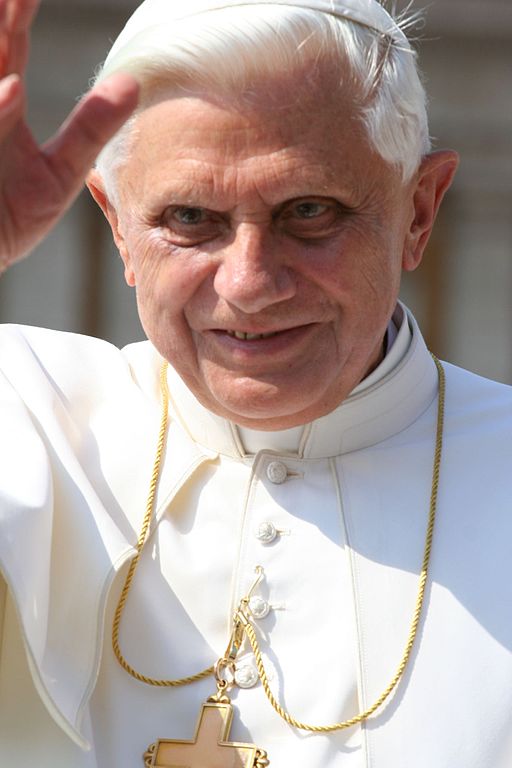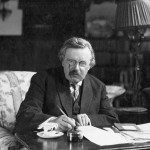(E.g., Joseph Ratzinger [Pope Benedict XVI], Hans Urs von Balthasar, and Henri de Lubac)

Pope Benedict XVI (6-7-06) [Wikimedia Commons / Creative Commons Attribution-Share Alike 2.0 Generic license]
***
(11-13-08)
***
This particular debate came about as a result of critiques from Protestant graduate student Kevin Davis (see my exchange with him). He and his comrade-in-arms, a Catholic named Mark (words in green), have tried to drive a wedge (quite typical — sadly — of a certain misinformed sort of Protestant and generally liberal Catholic criticism) between Catholic popular apologetics (that’s me, folks!), and Catholic academia and scholarship (the realm of professional theologians), with regard to their views of the Protestant distinctive of sola Scriptura. Nice try, but no cigar. Here is some of the relevant background along these lines (Kevin’s words in blue):
I went through my postmodern phase in undergrad (it lasted a few months lots of Foucault so sad), then I grew-up and moved on to Barth and de Lubac. (10-22-07)
. . . the immense ecclesiastical influence had by the Communio theologians, such as Henri de Lubac and Hans Urs von Balthasar, on the Catholic Church, especially as embodied in the papacies of John Paul II and Benedict XVI, a great Communio theologian himself. (11-10-07)
Thankfully, the Catholic Church has decidedly shifted away from these pseudo-Thomists and toward the Augustinian Thomists (Newman, Gilson, de Lubac, von Balthasar, Ratzinger, etc.) . . . You can presuppose that I have a great familiarity with both the Catholic and Protestant positions (so, for example, you don’t need to give quotations from councils, reformers, etc.). (10-21-08) [link in my comments section now defunct]
* * *Is the Protestant principle of sola scriptura illogical? Does it violate any formal rules of logic, namely committing the fallacy of circular argumentation (e.g., The reason I believe in the authority of scripture is because scripture claims authority from God) which, of course, entails begging the question? Dave Armstrong believes it does, and I think its fair to say that this is the general consensus of the Catholic apologetics world (which should be distinguished from academic Catholic scholarship).
Of course. But the Catholic academic world is divided into liberal / modernist and orthodox sections. The former might very well argue as Kevin does, while the latter would tend to argue as I do (since I, too, am an orthodox Catholic). Many contributors, for example, to the major (629 pages) critique book Not By Scripture Alone, were scholars: Philip Blosser, Ph.D. (professor of philosophy), Robert Fastiggi, Ph.D. (theologian and professor at Sacred Heart Seminary in Detroit, and a personal friend), Fr. Mitch Pacwa, S.J., Ph.D. (doctorate in Old Testament), and Fr. Peter M.J. Stravinskas, Ph.D., S.T.L.
So let’s be clear that this is not merely a “pop apologetics” thing. It’s the orthodox Catholic reply to the flawed Protestant rule of faith: made by scholars and non-clergy, non-academic laypeople alike. It would have been made by the Church fathers, who argued in the same fashion. In fact, many of the early heretics reasoned in the same way and tried to go by the Bible Alone, since they couldn’t point to historic pedigree for their heresies: most notably the Arians.
*
For the love of Pete! Does anyone know what this debate is about? Seriously, Catholics. Quit shifting the argument. You can do better than this. There is a reason serious Catholic scholars like Henri de Lubac and Hans Urs von Balthasar never claimed sola scriptura was illogical.They thought it wrong, but not illogical in the way that is being portrayed here. Being wrong and being illogical are different things. You know this, right? . . . Distinctions! Distinctions! Distinctions! We must make distinctions, people! (11-12-08) [link in my comments section now defunct]
Henri de Lubac, however, thought sola Scriptura was unCatholic, at the very least:
Christianity is not, properly speaking, a religion of the Book: it is a religion of the word (Parole) — but not uniquely nor principally of the word in written form. It is a religion of the Word (Verbe) — not of a word, written and mute, but of a Word living and incarnate (to quote St. Bernard). The Word of God is here and now, amongst us, which we have looked upon, and our hands have handled: the Word living and active, unique and personal, uniting and crystallizing all the words which bear it witness. Christianity is not the biblical religion: it is the religion of Jesus Christ. [Exégèse Médiévale, II/1 (Paris, 1961), pp. 196-9. (source URL)]
Pope Benedict XVI also argues (as I do, and have for 18 years now) that sola Scriptura is illogical, since he stated that there “can be no such thing” (to say something could not “be” in this sense, is precisely to say that it is illogical and inherently unreasonable; hence, unthinkable):
. . . the concept of “revelation” always implies a receiving subject: where there is no one to perceive “revelation,” no re-vel-ation has occurred, because no veil has been removed. By definition, revelation requires a someone who apprehends it. These insights, gained through my reading of Bonaventure, were later on very important for me at the time of the conciliar discussion on revelation, Scripture, and tradition. Because, if Bonaventure is right, then revelation precedes Scripture and becomes deposited in Scripture but is not simply identical with it. This in turn means that revelation is always something greater than what is merely written down. And this again means that there can be no such thing as pure sola scriptura (“by Scripture alone”), because an essential element of Scripture is the Church as understanding subject, and with this the fundamental sense of tradition is already given. (Milestones: Memoirs: 1927-1977, pp. 108-109)
Again, in The Ratzinger Report (1985), the Holy Father wrote (when he was a Cardinal):
Furthermore . . . an exclusive insistence on the sola scriptura of classical Protestantism could not possibly survive, and today it is in crisis more than ever precisely as a result of that ‘scientific’ exegesis which arose in, and was pioneered by, the Reformed theology. This demonstrates how much the Gospels are a product of the early Church, indeed, how the whole of Scripture is nothing other than tradition. So much so that a number of Lutheran scholars seem to converge with the view of the Eastern Orthodox: not sola scriptura but sola traditio. (p. 160)
I wrote just yesterday, in another critique of sola Scriptura:
Of what use is “authority” if it is not binding? One might contend that this is foreign to the very meaning of the word. Police have authority because they can compel action and arrest people, against their will. The IRS has authority because it can collect income tax. One either complies or they are punished. Judges have authority because they can compel and sentence. Teachers have authority over students; so do school principals, who can expel students. Etc., etc., etc. It always means binding decrees and compulsion.
But then we get to Protestant human “authority” which is really no authority in the end at all, because Luther said “here I stand: and appealed to the abstract notion of “evident reasoning” and “clear Scripture.” The individual decides in the end. The “authority” only has an advisory capacity. One can have great, immense respect for an advisor, but he is still that: an advisor: just as presidential advisor can always be overruled by the President. He gives advice: he has no power to dictate or compel. If a Protestant doesn’t like something, he can always go to another denomination. What, in Luther’s and sola Scriptura principles, can stop him? Nothing.
Today I discovered, in doing research for the present bogus criticisms, that the Holy Father made essentially the same argument, in different words, in his Principles of Catholic Theology (1987), p. 222 (see section b): contending that sola Scriptura has reduced binding tradition to mere powerless “custom”. Nevertheless, we “pop” Catholic apologists and the real Catholic scholars like the pope allegedly have vastly different views on sola Scriptura, because Kevin and Mark have knowingly informed us that this is the case.
The pope again chastises Luther for his views that lead to internal logical tension (hey, that’s kind o’ like how I argued, ain’t it?), in his book, The Spirit of the Liturgy (2000):
Despite the radicalism of his reversion to the principle of “Scripture alone”, Luther did not contest the validity of the ancient Christian creeds and thereby left behind an inner tension that became the fundamental problem in the history of the Reformation . . . With the radicalization of the historical-critical method, it has become very clear today that the sola scriptura principle cannot provide a foundation for the Church and the commonality of her faith. Scripture is Scripture only when it lives within the living subject that is the Church. (p. 167; my bolding)
At the end of my posted debate with Kevin I exclaimed in exasperation (as indicated by all caps and bolding):
I’m not arguing about the authority of Scripture. All sides accept that, and validly so, and it is a separate argument, not under dispute between us. What is disagreed upon (I’ll repeat yet again) is how the authority of said Scripture is RELATED to the Church and tradition. We say it is a “three-legged stool.” You place Scripture above the other two: infallible and binding where they are not.
Kevin replied to the first two sentences of that as follows:
What? Is this a joke? You are very much arguing about how the Protestant can claim the sole authority of scripture, while not claiming the Church to be infallible. If the Protestant position is self-defeating then they cannot really claim the authority of scripture; thus, you are arguing about the authority of scripture for Protestants. (11-12-08) [link in my comments section now defunct]
That was yesterday. Today I find once again that the Holy Father has already made an argument that states basically the same thing that I did above (that Kevin thought was a “joke”) in even stronger terms:
The question of the sufficiency of Scripture is only a secondary problem within the framework of the far more fundamental decision . . . that thus concerns the relationship between the authority of the Church and the authority of Holy Scripture; everything else depends on how we understand that. (God’s Word [2008], p. 50)
But we all know that orthodox Catholic scholars and theologians and popes all argue about these things in a vastly different fashion than lowly Catholic apologists like myself do, right? Or in fact, they hold different opinions of sola Scriptura altogether, over against those of vacuous, “inane” blowhards like myself (as Kevin and Mark appear to think). And that is because these two distinguished gentlemen have told us so, and they (like Luther and Calvin of old) speak with authority.
Remember, above, that my critic Mark claimed that Hans Urs von Balthasar “never claimed sola scriptura was illogical.” Is that so? Well, I’ll let readers mull over the following passage of his (which again argues in much the same vein as my own many critiques) and decide for themselves:
So we can grant that Scripture has a sufficientia, provided that it has its place within the Church (herself endowed with the Spirit and with the guardianship of ecclesial office) and is preached, read, and interpreted within the Church. This is how the Fathers and the Middle Ages generally understood the sufficiency of Scripture. But this understanding must be clearly separated from the sola scriptura principle of the Reformers, who — in a nutshell — lifted Scripture out of the “sacrament” that the Church is and set it up as a norm over against the Church . . .
The mission to preach and interpret the mystery cannot be divorced from ecclesial office, which comes explicitly from Christ’s command. . . .
If the Bible is not situated in this context, then, as Shakespeare says, the devil himself can quote Scripture for his own ends. Jerome had already observed that “we could all take the letter and use it to promote some new doctrine.” Taken in isolation, as in Protestant orthodoxy, it changes Christianity into the religion of a book. The great Reformers prepared a path for this development by cutting the Bible loose from tradition and office and then linking it with the Holy Spirit in such a way that the Spirit rendered the Bible “self-evident.” Nowadays, however, this “principle of Scripture” is largely relativized . . . (Theo-Logic, Vol. III [2005], pp. 325-327)
Let’s see what else von Balthasar says:
If there is no ecclesial office that derives its authority from Christ, then there exists no normative continuity between the faith of the original Church and the faith of the Church today. . . .
The two forms cannot be combined. For in the first form of theology, and authority is present which binds one to the essential Creed in harmony with the witness of Scripture. In the second form, where sola scriptura has validity, the question remains whether Scripture alone can bind one to such a creed. (A Short Primer For Unsettled Laymen [1985]; pp. 59-60)
So much for the supposed “wall of separation” between Catholic apologists and renowned Catholic theologians of recent decades, with regard to the critique of sola Scriptura. The true division is not between Catholic apologists and Catholic theologians, popes, etc., but between orthodox and heterodox Catholics, and between orthodox Catholics and Protestants.
*****













